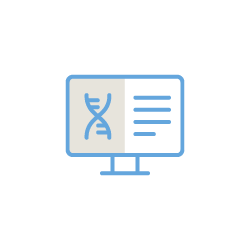Providing insights into unclear health conditions through Mitochondrial testing
What is Mitochondrial testing?
Mitochondrial testing can help identify genetic changes causing mitochondrial disorders in either the nuclear DNA (nDNA) or mitochondrial DNA (mtDNA). Mitochondrial disorders may result from genetic changes in nDNA or mtDNA. Genetic changes in nDNA may be inherited from one or both parents. Genetic changes in mtDNA are only inherited from an individual’s mother. Changes in mtDNA might be new to the affected patient (de novo) or inherited from their mother who has a change in some mitochondria but not enough altered mtDNA to be affected herself.
Who should consider Mitochondrial testing?
Mitochondrial disorders can be identified at any point in a patient’s life. Multiple systems are often impacted by these disorders – the systems affected and severity of symptoms can vary greatly even between other affected family members.
Mitochondrial disorders might be caused by nDNA or mDNA changes . . .
Some of the most commonly affected organ systems:
If a mitochondrial disorder is suspected based on clinical symptoms or family history, additional genetic testing may be recommended to confirm the diagnosis.
Common Symptoms:
- Ataxia
- Stroke or stroke-like episodes
- Seizures
- Dementia
- Neuropathy
- Myopathy and cardiomyopathy
- Developmental delay
- Vision and hearing deficits
- Diabetes and other endocrine symptoms
- Gastrointestinal symptoms, such as pseudo-obstruction and dysmotility
- Laboratory abnormalities, such as elevated lactate: pyruvate ratio
TEST CODE |
PANEL NAME |
2000 |
MitoMet®Plus aCGH Analysis |
2010 |
Advanced mtDNA Point Mutations and Deletions by Massively Parallel Sequencing (17 genes) |
2055 |
Comprehensive mtDNA Analysis by Next Generation Sequencing (MitoNGSSM) |
2085 |
Dual Genome Panel by Massively Parallel Sequencing (BCM_MitomeNGSSM) |
2086 |
Mitome200 Nuclear Panel (164 nuclear genes) |
2100 |
CoQ10 Deficiency Panel (5 genes) |
2130 |
mtDNA Depletion/Integrity Panel (19 genes) |
2140 |
Progressive External Ophthalmoplegia (PEO) Panel (10 genes) |
2155 |
Mitochondrial Respiratory Chain Complex I Deficiency Panel (21 genes) |
TEST CODE |
PANEL NAME |
2160 |
Mitochondiral Respiratory Chain Complex II Deficiency Panel (5 genes) |
2165 |
Mitochondiral Respiratory Chain Complex III Deficiency Panel (4 genes) |
2170 |
Mitochondrial Respiratory Chain Complex IV Deficiency Panel (10 genes) |
2175 |
Mitochondrial Respiratory Chain Complex V Deficiency Panel (3 genes) |
2180 |
Mitochondrial Respiratory Chain Complex I – V Panel (43 genes) |
2185 |
PDH & Mitochondrial Respiratory Chain Complex V Panel (9 genes) |
20601 |
Leigh Disease Panel (82 nuclear genes) |
TEST CODE |
PANEL NAME |
2095 |
Fatty Acid Oxidation Deficiency Panel (20 genes) |
2100 |
CoQ10 Deficiency Panel (5 genes) |
2105 |
Cholestasis Panel (7 genes) |
2110 |
UCD and Hyperammonemia Panel (8 genes) |
2120 |
Cobalamin Metabolism Panel + Severe MTHFR Deficiency by Massively Parallel Sequencing (20 genes) |
2125 |
Glycogen Storage Disease (GSD) Comprehensive Panel (23 genes) |
2126 |
Glycogen Storage Disease (GSD) Muscle Panel (13 genes) |
2127 |
Glycogen Storage Disease (GSD) Liver Panel (13 genes) |
2300 |
Myopathy/Rhabdomyolysis Panel (25 genes) |
2345 |
Trifunctional Protein Deficiency Panel (2 genes) |
2347 |
Propionic Acidemia Panel (2 genes) |
TEST CODE |
PANEL NAME |
2349 |
Multiple Acyl-CoA Dehydrogenase Deficiency (MADD) Panel (3 genes) |
3780 |
Methylmalonic Acidemia Panel (3 genes) |
3782 |
3-Methylcrotonyl-CoA Carboxylase (3MCC) Panel (2 genes) |
5095 |
Congenital Disorders of Glycosylation (CDG) Panel (36 genes) |
5270 |
Proximal Urea Cycle Disorders Panel (3 genes) |
5405 |
Hemochromatosis Panel by Sanger Sequencing (5 genes) |
21700 |
Hyperinsulinism Panel (8 genes) |
21900 |
Maturity Onset Diabetes of the Young (MODY) Panel (25 genes) |
22100 |
Peroxisomal Disorders Panel (22 genes) |
32870 |
Maple Syrup Urine Disease (MSUD) Panel (4 genes) |
TEST CODE |
PANEL NAME |
3200 |
Mitochondrial Respiratory Chain Enzyme Analysis (ETC) – Skeletal Muscle |
3210 |
Mitochondrial Respiratory Chain Enzyme Analysis (ETC) – Skin Fibroblasts |
3700 |
Mitochondrial DNA Content (qPCR) Analysis – Skeletal Muscle |
3720 |
Mitochondrial DNA Content (qPCR) Analysis – Liver |
Delivering Answers for Your Patients With Neurological and Multi-systemic Symptoms


SAMPLE TYPE |
REQUIREMENTS |
SHIPPING CONDITIONS |
|---|---|---|
|
Draw blood in an EDTA (purple-top) tube(s) and send 3-5 cc (Adults/Children) and 3-5 cc (Infant |
Ship at room temperature in an insulated container by overnight courier. Do not heat or freeze. |
|
1-2 cc for Cord Blood. Ensure properly labeled. Also send 3 cc of maternal blood in properly labeled EDTA tube for MCC studies at no charge as needed. |
Ship at room temperature in an insulated container by overnight courier. Do not heat or freeze. |
|
Send three (3) T25 flasks at approximately 60-80% confluence. |
Ship at ambient temperature in an insulated container by overnight courier. |
|
50mg for Tissue |
Fresh Tissue should be flash frozen in liquid nitrogen at collection with no media added, stored at -80°C, and shipped by overnight courier on 3-5 lbs of dry ice. |
|
50mg for Liver |
Liver should be flash frozen in liquid nitrogen at collection with no media added, stored at -80°C, and shipped by overnight courier on 3-5 lbs of dry ice. |
|
Send at least 5ug of purified DNA (minimal concentration of 50ng/uL; A260/A280 of ~1.7). |
Ship at room temperature in an insulated container by overnight courier. Do not heat or freeze. |
|
Collected with Oragene DNA Self-Collection Kit. |
Ship at room temperature in an insulated container by overnight courier. Do not heat or freeze. |
|
50mg for Muscle |
Skeletal Muscle should be flash frozen in liquid nitrogen at collection with no media added, stored at -80°C, and shipped by overnight courier on 3-5 lbs of dry ice. |
How It Works:
Order appropriate testing for your patient.
The patient’s sample is collected.
The patient’s sample is sent to Baylor Genetics.
Results are sent to the physician.
Discuss the results with the patient.
More questions? Please contact us by calling 1.800.411.4363.
Experiences from dual genome next-generation sequencing panel testing for mitochondrial disorders: a comprehensive molecular diagnosis
Gorman E, Dai H, Feng Y, Craigen WJ, Chen DCY, Xia F, Meng L, Liu P, Rigobello R, Neogi A, Eng CM, Wang Y. Experiences from dual genome next-generation sequencing panel testing for mitochondrial disorders: a comprehensive molecular diagnosis. Front Genet. 2025 Mar 5;16:1488956. doi: 10.3389/fgene.2025.1488956. PMID: 40110048; PMCID: PMC11920145.
Detection of Clinically Relevant Monogenic Copy-Number Variants by a Comprehensive Genome-Wide Microarray with Exonic Coverage
Chau MHK, Anderson SA, Song R, Cooper L, Ward PA, Yuan B, Shaw C, Stankiewicz P, Cheung SW, Vossaert L, Wang Y, Owen NM, Smith J, Bacino CA, Schulze KV, Bi W. Detection of Clinically Relevant Monogenic Copy-Number Variants by a Comprehensive Genome-Wide Microarray with Exonic Coverage. Clin Chem. 2025 Jan 3;71(1):141-154. doi: 10.1093/clinchem/hvae188. PMID: 39749505.
Positive findings in clinical mitochondrial genome testing by NGS
Yang J, Kao CY, Jiang Y, et al. Positive findings in clinical mitochondrial genome testing by NGS. Presented at: Annual Meeting of The American Society of Human Genetics; October 27, 2022; Los Angeles, CA.
Whole genome sequencing of mitochondria: a powerful tool for clinical diagnosis of human mitochondrial diseases
Yang J, Wang L, Kao CY, et al. Whole genome sequencing of mitochondria: a powerful tool for clinical diagnosis of human mitochondrial diseases. Presented at: The ASHG Annual Meeting 2021; October 18-22, 2021; Virtual Experience.
Clinical and laboratory interpretation of mitochondrial mRNA variants
Wong LC, Chen T, Schmitt ES, et al. Clinical and laboratory interpretation of mitochondrial mRNA variants. Hum Mutat. 2020;41(10):1783-1796. doi:10.1002/humu.24082.
Interpretation of mitochondrial tRNA variants
Wong LC, Chen T, Wang J, et al. Interpretation of mitochondrial tRNA variants [published correction appears in Genet Med. 2020 May;22(5):979. doi: 10.1038/s41436-020-0770-0] [published correction appears in Genet Med. 2020 Jun;22(6):1130. doi: 10.1038/s41436-020-0802-9]. Genet Med. 2020;22(5):917-926. doi:10.1038/s41436-019-0746-0.
FBXL4-Related Encephalomyopathic Mitochondrial DNA Depletion Syndrome
Almannai M, Dai H, El-Hattab AW, Wong LJC. (2017) FBXL4-Related Encephalomyopathic Mitochondrial DNA Depletion Syndrome. In: Adam MP, Ardinger HH, Pagon RA, Wallace SE, Bean LJH, Mefford HC, Stephens K, Amemiya A, Ledbetter N, editors. GeneReviews® [Internet]. Seattle (WA): University of Washington, Seattle; 1993-2017. PMID: 28383868
Shp deletion prevents hepatic steatosis and when combined with Fxr loss protects against type 2 diabetes
Akinrotimi O, Riessen R, VanDuyne P, Lee YK, Wong LJ, Zavacki AM, Schoonjans K, Anakk S. Shp deletion prevents hepatic steatosis and when combined with Fxr loss protects against type 2 diabetes. Hepatology 2017: PMID: 28586124
Kinetic and structural changes in HsmtPheRS, induced by pathogenic mutations in human FARS2
Kartvelishyvili E, Tworowski D, Vernon H, Chrzanowska-Lightowlers Z, Moor N, Wang J, Wong LJ, Safro M. Kinetic and structural changes in HsmtPheRS, induced by pathogenic mutations in human FARS2. Protein Science 2017 PMID: 28419689
Capture-based high-coverage NGS: a powerful tool to uncover a wide spectrum of mutation types
Wang J, Yu H, Zhang VW, Tian X, Feng YM, Wang G, Gorman E, Wang H, Lutz RE, Schmitt ES, Peacock S, Wong LJ. Capture-based high coverage NGS: a powerful tool to uncover a wide spectrum of mutation types. Genet in Med. 2016 May;18(5):513-21. doi: 10.1038/gim. 2015.121. Epub 2015 Sep 24. PMID: 26402642
Improved diagnosis of inherited retinal dystrophies by high fidelity PCR of ORF15 followed by NGS
Li J, Tang J, Feng Y, Xu MC, Chen R, Zou X, Sui RF, Chang EY, Lewis RA, Zhang VW, Wang J, Wong LJ. Improved diagnosis of inherited retinal dystrophies by high fidelity PCR of ORF15 followed by NGS. J Mol Diagn. 2016 PMID: 27620828
Rapid molecular diagnostics of severe primary immunodeficiency by targeted next-generation sequencing
Yu H, Zhang VW, Stray-Pedersen A, et al. Wong LJ. Rapid molecular diagnostics of severe primary immunodeficiency by targeted next-generation sequencing. J Allergy Clin Immunol. 2016, 138:1142-51. doi: 10.1016/j.jaci.2016.05.035. PMID: 27484032
Detection and quantification of mosaic mutations in disease genes by next generation sequencing
Qin L, Wang J, Tian X, Yu H, Truong C, Mitchell JJ, Wierenga KJ, Craigen WJ, Zhang VW, Wong LJ. Detection and quantification of mosaic mutations in disease genes by next generation sequencing. J Mol Diagn. 2016 May;18(3):446-53. doi: 10.1016/j.jmoldx. 2016.01.002. Epub 2016 Mar 2. PMID: 26944031
FBXL4 defects are common in patients with congenital lactic academia and encephalomyopathic mitochondrial DNA depletion syndrome
Dai HZ, Zhang VW, El-Hattab AW, Ficicioglu C, Shinawi M, Lines M, Schulze A, McNutt M, Gotway G, Tian X, Chen S, Wang J, Craigen WJ, Wong LJ. FBXL4 defects are common in patients with congenital lactic academia and encephalomyopathic mitochondrial DNA depletion syndrome. Clin Genet 2016 doi:10.1111/cge.12894 PMID: 27743463
Fatty acid oxidation-driven Src links mitochondrial energy reprogramming and oncogenic properties in triple-negative breast cancer
Park JH, Vithayathil S, Kumar S, Sung PL, Dobrolecki LE, Putluri V, Bhat VB, Bhowmik SK, Gupta V, Arora K, Wu D, Tsouko E, Zhang Y, Maity S, Donti TR, Graham BH, Frigo DE, Coarfa C, Yotnda P, Putluri N, Sreekumar A, Lewis MT, Creighton CJ, Wong LJ, Kaipparettu BA. Fatty acid oxidation-driven Src links mitochondrial energy reprogramming and oncogenic properties in triple-negative breast cancer. Cell Rep. 2016 Mar 8;14(9):2154-65. doi: 10.1016/ j.celrep.2016.02.004. Epub 2016 Feb 25. PMID: 26923594
Expanding genotype/phenotype of neuromuscular diseases by comprehensive target capture/NGS
Tian X, Liang WC, Feng YM, Wang J, Zhang VW, 6 others, Wong LJ, Jong YJ. Expanding genotype/phenotype of neuromuscular diseases by comprehensive target capture/NGS. Neurol Genet. 2015 Aug 13;1(2):e14. doi: 10.1212/NXG.0000000000000015. eCollection 2015. [Editorial comments, Neurol Genet] PMID: 27066551
A comprehensive strategy for accurate mutation detection of the highly homologous PMS2 gene
Li J, Dai H, Feng Y, Tang J, Chen S, Tian X, Gorman E, Schmitt ES, Hansen T, Wang J, Plon SE, Zhang VW, Wong LJ. A comprehensive strategy for accurate mutation detection of the highly homologous PMS2 gene. J Mol Diagn. 2015 Sep;17(5):545-53. doi: 10.1016/j.jmoldx. 2015.04.001. [with Press Release] PMID: 26320870
Transition to next generation analysis of the whole mitochondrial genome: a summary of molecular defects
Tang S, Wang J, Zhang VW, Li FY, Landsverk M, Cui H, Truong CK, Wang G, Chen LC, Graham B, Scaglia F, Schmitt ES, Craigen WJ, Wong LJ. Transition to next generation analysis of the whole mitochondrial genome: a summary of molecular defects. Hum. Mutat. 2013 June;34(6):882-93. Pubmed PMID: 23463613
Low-level Large Deletions in Mitochondrial Genome: A Potential Diagnosis of Mitochondrial Diseases
Jun Yang, Tiansheng Chen1, Eric Kao, Jie Dong, John Lattier, Hongzheng Dai, Linyan Meng, Fan Xia, Eric S. Schmitt, Sandra Peacock, Robert Rigobello, William J Craigen, Lee-Jun C Wong, Christine M. Eng, Yue Wang. Poster presented at UMDF, 2024.
Non-invasive prenatal sequencing for multiple Mendelian monogenic disorders using circulating cell-free fetal DNA
Zhang J, Li J, Saucier JB, Feng Y, Jiang Y, Sinson J, McCombs AK, Schmitt ES, Peacock S, Chen S, Dai H, Ge X, Wang G, Shaw CA, Mei H, Breman A, Xia F, Yang Y, Purgason A, Pourpak A, Chen Z, Wang X, Wang Y, Kulkarni S, Choy KW, Wapner RJ, Van den Veyver IB, Beaudet A, Parmar S, Wong LJ, Eng CM. Non-invasive prenatal sequencing for multiple Mendelian monogenic disorders using circulating cell-free fetal DNA. Nat Med. 2019 Mar;25(3):439-447. doi: 10.1038/s41591-018-0334-x. Epub 2019 Jan 28. Erratum in: Nat Med. 2019 Apr;25(4):701-702. doi: 10.1038/s41591-019-0391-9. PMID: 30692697.





